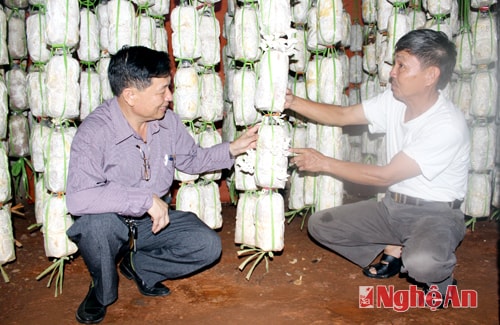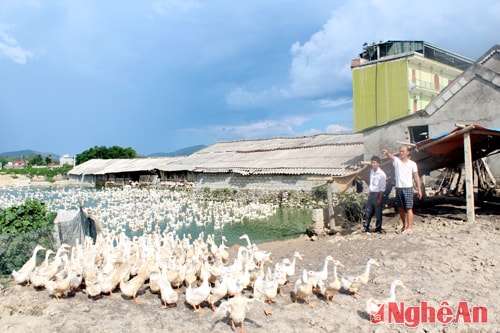Positive changes in the "rice country"!
(Baonghean) - The economic models of family farms and concentrated farms in the direction of commodity production and livestock raising are creating positive changes in the "rice homeland" of Yen Thanh. This shift brings the agricultural and rural economic structure towards rapidly increasing the proportion of commodity production, creating concentrated production areas, contributing significantly to the construction of sustainable new rural areas with many industries.
In early August, Mr. Le Van Hanh, in hamlet 12, Son Thanh commune, was really excited to receive more orders for mushroom seed production from localities in Yen Thanh and Nghi Loc districts and some households in Vinh city. This not only promoted the mushroom production line in which his family invested nearly 1.5 billion VND, but more importantly, he was proud to be the first household in Nghe An province to succeed in mushroom seed production, opening up many opportunities to be proactive in economic development. In fact, commercial mushroom cultivation has been established in many localities in the province for several years, but all had to import "seeds" from other places. Passionate about mushrooms, Mr. Hanh wondered why he could not be proactive in the seeds (?).
 |
| Mushroom seed production model of Mr. Le Van Hanh's family, Son Thanh commune. |
With the strong support of his son who is good at biology, he boldly borrowed capital and asked the commune to grant land to establish a facility to produce mushroom seeds and commercial mushrooms. After half a year of testing, by mid-2014, the first “made in Son Thanh” - Yen Thanh seed pots were produced and tested by his own family. He invited the first batches of oyster mushrooms, lingzhi mushrooms and wood ear mushrooms to try, and everyone was impressed. Many households ordered seed pots to plant, and he gave them meticulous and thoughtful instructions to maximize their effectiveness.
When he succeeded with large batches of seeds and orders from people, Mr. Hanh's family decided to complete business registration procedures and find ways to sign contracts with businesses and supermarkets in Vinh City and other localities to consume the products. Happily boasting about his achievements in mushroom breeding, Mr. Hanh still had concerns: "At first, when I invested in the production line, I was only worried about how to produce mushroom seeds. But now I am more worried about the output issue. Our production line can produce tens of thousands of seed pots for my family and people to grow, but with the development of mushrooms, there needs to be a stable output. Especially oyster mushrooms, because this type of mushroom is fresh and rich in nutrients, while people's tastes are not yet widespread...". Referring to this aspect, Mr. Nguyen Tri Hoa - Secretary of the Party Committee of Son Thanh commune said: “We are accompanying this model by supporting land rent tax exemption and reduction, and at the same time helping to promote the brand to create a spreading effect. Economic models like that of Mr. Hanh's family, the commune is researching to replicate. Because these are self-sustaining models besides rice and livestock development, creating a solid foundation in the process of economic restructuring of the locality…”.
 |
| Farm model with over 3,500 ducks of Mr. Nguyen Van Hai's family - Khanh Thanh commune. |
In Khanh Thanh commune, in recent years, there have been 14 large-scale livestock farm models, becoming typical examples of household economic development in Yen Thanh district. In the first 6 months of 2014, while in many places, livestock herds have decreased, the models of raising ducks, pigs, buffaloes and cows for goods in the commune still grew. The report of the commune People's Committee shows that, compared to the same period last year, the number of buffaloes and cows increased by 121, the number of pigs increased by 860, and the number of poultry increased by 422. These results demonstrate the sustainability of concentrated livestock models. Among those models, Mr. Nguyen Van Hai's family in Khanh Hoa hamlet is "famous" for raising ducks.
On an area of 3 hectares of land, his family fenced off a pond, releasing 3,500 to 4,000 ducks at a time. Every day, his family has over 2,700 eggs to import to purchasing agents. At present, with a price of 2,500 VND/egg, his family earns an average of over 6 million VND per day. After deducting food and labor costs, his family has a significant source of income. The day we visited, Mr. Hai's family was building a few more rows of cages to release a new batch of ducks. He shared: "This job looks "healthy" at first glance, but it requires a lot of effort. The most difficult thing is when you first release a new flock of ducks. This type of duck is difficult to raise when young, requiring good wind protection and disease prevention. And another important thing is that we have to sign contracts with a number of incubators and purchasing units to ensure stable output. My family's model has been stable for many years now..."
Up to now, Yen Thanh district has 354 households and 58 large-scale farms with high economic efficiency. The characteristics of these models are livestock and crop farming, suitable for the "rice homeland" area. According to the assessment, the average revenue of each farm and household farm in the district reaches an average of 1 billion VND/year, in which, livestock models have higher value thanks to faster capital turnover. The farms and household farms have contributed to shifting the economic structure, developing crops and livestock with high economic value; Gradually forming a "way" of large-scale production, limiting dispersion and fragmentation, creating concentrated commodity production areas with high levels of intensive farming. In particular, the development of the household and farm economy is always associated with the program of developing key crops and livestock of the district and with the exploitation and effective use of resources in agriculture and rural areas. On the other hand, the development of farm economy contributes to promoting growth in rural areas thanks to the promotion of the application of science and technology, the application of new technology in production and animal husbandry. That has contributed positively to increasing the number of rich households, creating jobs, and increasing income for workers in the area.
In order for these models to develop stably, the People's Committee of Yen Thanh district has directed the Department of Agriculture, the Farmers' Association, the Cultivation Association, and the authorities and organizations of the communes to increase technical support for livestock farming and production for the people; At the same time, help farm and family farm owners gain experience in organizing, managing and operating production and livestock farming. In particular, in early June 2014, the People's Committee of the district issued Project 2811 on farm economic development, period 2014 - 2020. According to the plan, Yen Thanh will increase from 10 - 15 farms each year, striving to have 150 - 160 farms meeting the criteria by 2020, focusing on increasing the number of forestry farms, mixed farms, livestock farms and aquaculture farms. According to Mr. Nguyen Van Duong - Head of the District Agriculture Department, the issuance of the farm development project aims to develop the economy in accordance with the overall development plan of the district associated with the management of the new rural construction planning of the approved communes.
In this project, in addition to incentive mechanisms, the district also sets out the requirement to ensure a balance of resources as well as environmental protection, promoting the strengths, natural conditions, and socio-economic conditions of each region and locality. Mr. Duong affirmed: “The district identifies priority issues for each type of farm in the direction of: improving quality, taking livestock farms, crop development and aquaculture as the core; From there, mobilize all resources in terms of land, labor, and capital to produce agricultural products and livestock products; contribute to the redistribution of labor, job creation and income increase. This approach aims to create a shift from small-scale household farming to the application of advanced science and technology, contributing to promoting the process of restructuring the agricultural and rural economy. This is a short-term and long-term goal in economic development in the district…”.
Article and photos:Nguyen Son






